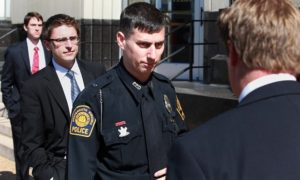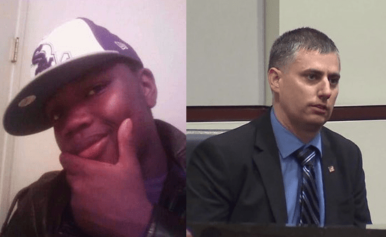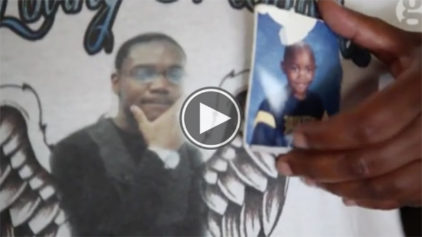
Officer Stephen Rankin leaves the US district court building in Norfolk, Virginia, with his attorneys in 2012. (Brian J. Clark/The Virginian-Pilot}
A Virginia prosecutor has decided to file charges against a Portsmouth police officer who shot an unarmed Black youth earlier this year.
Officer Stephen Rankin shot 18-year-old William Chapman after he tried to arrest him on shoplifting charges. Witnesses say Chapman broke free from Rankin and was shot dead when he stepped towards the officer. Police have declined to say if Chapman had stolen property on him.
Stephanie Morales, the commonwealth’s attorney for Portsmouth, said there was enough evidence against Rankin to move forward with an indictment.
“The Commonwealth’s Attorney’s Office has reviewed all evidence and will seek an indictment before the next grand jury,” said Tamara Shewmake, a spokeswoman for the prosecutor.
The case is troubling on many levels. Apart from the fact there was no evidence found against Chapman, this is the second fatal shooting Rankin has been involved with. In 2011, Rankin shot Kirill Denyakin, a 26-year-old Kazakhstani cook. Rankin had responded to a noise complaint and shot Denyakin after he claimed he charged at him reaching for his waistband. No weapon was found on his body.
Rankin later used a pseudonym to post messages taunting the Denyakin family, who filed an unsuccessful $22 million lawsuit against him.
“22 mil wont buy your boy back,” he wrote.
Rankin also compared the shooting to his actions in Iraq.
“What’s the difference if it was one round or 11 rounds or 111 rounds?” he wrote, using the screen name ‘yourealythinkthat.’ “When I was in Iraq, that would have been a good shoot. In fact, nobody would have really given it a second thought.”
However, Rankin’s actions were criticized by commenters a local newspaper’s website.
“Talk to the men and women in our armed forces who face people with weapons every day,” wrote one. “You don’t use deadly force against unarmed citizens – ever.”
Many people question why Rankin had to use deadly force on two occasions, especially as he was trained in the Marine Corps’ martial arts programs, which specializes in teaching people how to take assailants alive. The Portsmouth police force actively recruits former military personnel from a nearby Navy base in Norfolk. According to The Guardian, a former Portsmouth officer described Rankin as “afraid of his own shadow.” Weeks before the first shooting, senior commanders warned his lieutenant that Rankin was “dangerous,” and likely to cause someone harm.
Morales’ decision to indict Rankin seems to signify a new trend of prosecutors willing to hold police officers accountable for fatal shootings. However, even though prosecutors present their findings to a grand jury, officers are not always punished. This was the case in St. Louis, where a grand jury failed to indict Ferguson Officer Darren Wilson for the fatal shooting of Michael Brown. Many critics accused St. Louis County District Attorney Bob McCulloch of acting like Wilson’s defense attorney. McCulloch has failed to prosecute any police shootings in 23 years on the job.
But a new California law takes away a grand jury’s ability to prosecute officers. California recently passed a law that would ban secret grand juries when deciding to charge officers who use deadly force.
The bill was motivated by widespread protests against the grand juries that decided not to prosecute police in Ferguson and New York, who were involved in fatalities.

